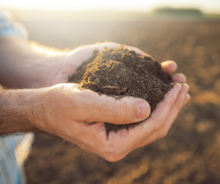How the Beatles & Beyoncé are Powering Soil Conservation Research in Alberta

When you think of accepting an internship with ALI’s Soil Health Initiative, images of standing in a canola field, digging up soil cores and getting dirty come to mind.
But for two U of A law students, first-year Kyle Whitlock and second-year Monika Sharma, it means spending days on their home computers digging around the internet to research the current state of soil legislation.
ALI’s Soil Health Initiative seeks to strengthen public policy, amplify scientific knowledge, and improve agricultural producer practices in the area of soil health. The work will increase overall awareness of soil health, improve decision-making and improve Alberta’s soil health over the long term.
Our communications advisor, Kim, recently caught up with them to talk about what interests them about their work and how they tackled soil legislation research during a pandemic.
Kim: What intrigued you to pursue this opportunity?
Kyle: Coming from the small town of Vermillion, I’ve always been pretty interested in agriculture, especially the business side of it, so I really wanted to better understand how these agriculture businesses operate.
Learning what kind of regulations affect farmers and AG producers, and reading surveys by farmers on how much they know about the regulations is super interesting. I’m curious to see what practices they employ to protect the soil. Seeing it from that side, along with growing up in a farming community, and mixing it with law is perfect for me.
Monika: Having spent summers working for the Ministry of Agriculture & Forestry during my undergrad, I learned what resources are available to agricultural producers.
I’ve enjoyed studying environmental law and learning about the environmental issues we are facing in our country and how laws and regulations can help us respond.
I also really enjoyed property law and thought this project would be a good fit for my interests.
Kim: What do you enjoy most about the work?
Monika: It’s my first exposure to this kind of legal research. It’s been interesting to learn about that process: how to create findings, when to cut losses and start focusing on something else.
Kyle: It’s my first experience in legal research – With a BSc in Immunology, I’ve done a lot of scientific research. In science research when you don’t know something, you can test it in the lab or in the field. But in law, if you can’t find something, you can’t just go test it in the courtroom. The fact that we can’t really do anything about it, until litigation happens, is really interesting to me.
Monika: It’s interesting because it gives you some motivation to address the gaps, change the law, gives you ideas to propose.
Kim: What do you find most challenging about the work? Any early insights?
Kyle:
ALI's project reveals a lot of gaps in the regulation and case law that govern our soils.
We see that not all AG producers are supported to a) know there is legislation to protect soil condition and health, and b) take action to better manage soil health.
Our research shows that if there’s a problem, AG Field Agents are providing some guidance and “warnings.”
Alberta has legislation called the Soil Conservation Act, but how it's enforced is not entirely clear. One of the goals of the project is to draw attention to that.
Monika: I’d agree with all of that. But also, working from home and starting a new position during a pandemic has been...interesting. I prefer to work in a more collaborative space to bounce ideas around. Even though we have video meetings and calls, it’s still a little tricky to do it alone.
Kyle: Yes...It’s been an extremely independent experience.
Kim: What would you like to see your research lead to?
Kyle: The knowledge about the best soil health practices is still pretty low. I’d like more farmers to know about the Soil Conservation Act and be eligible for incentives to protect soil health.
Monika:
If it led to more informational resources and more financial incentives for agricultural producers, that would be most helpful.
There’s a gap in Alberta to help producers learn about regulations and about the different conservation practices they could implement to ensure they abide by those regulations.
Kim: And for fun, what’s playing in your headphones and keeping you company these days?
Kyle: The Beatles, obviously!
Monika: Beyoncé - always!!
What's up next for the Soil Health Initiative:
After we review and consolidate Monika and Kyle’s work, we'll compare the legislative framework in Alberta to other provinces.
In the coming months, we'll establish a working group of soil health champions and experts to lead the conversation in Alberta.
Researchers should also stay connected - in the near future, we plan to issue a call for research proposals, based on the outcomes of our working group and research (exact timing TBD).
To stay looped into the research, working group or call for proposals, subscribe to our newsletter in the footer below.